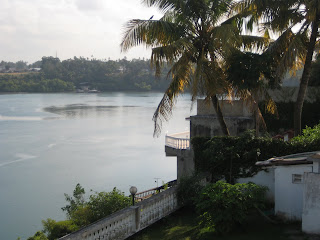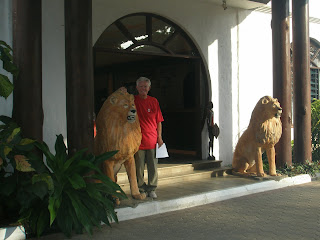Hi Loved Ones & Friends,
After around 10 days of traveling and working on the measles program, we finally went on safari & game drives…what an adventure!!!! We hope you’ll enjoy some of the attached photos. Sunset on the right is our view of Mount Kilimanjaro in Tanzania from our
Kilaguni Lodge in
Tsavo West.

We think Heavenly Father was blessing us for our work because we saw enough animals in our 2 days to last a lifetime, including some unusual experiences I’ll describe below.

We could hardly believe it all. Around 300 elephants, herds of zebras, water buffalo, many giraffes, baboons, monkeys,
wildebeests, heartbeats, ostriches, hippos, warthogs, jackals, hyenas, many varieties of gazelles, elands, sable bucks, water bucks, and all kinds of birds, etc etc etc.
There were so many in the different waterholes and game drives that seeing them got a little mundane as we were anxiously looking for rhino, cheetah, lions, and leopards. And, we did see lions and leopards! And, we hope to see rhinos and cheetahs sometime along the way. It was so exciting!

The lodge and tent we stayed in overlooked waterholes, where the animals regularly came to drink throughout the day.
Using binoculars, we saw them coming from a mile away out of the bush or along the vast savannas and grasses. Elephants would come in small herds of 4 or 5, led by the female matriarch.

Zebras in large herds, water buffaloes in lines of a dozen or so, hippos in the water during the day and out to feed during the early morning and evening hours, baboons scampering in from everywhere, gazelles everywhere, warthogs running in and out with their cute tails straight up, reminding us of “Lion King,” jackals skulking around, giraffes coming in and out in 2’s and 3’s, huge storks and other exotic birds swooping in and out, etc etc.

Especially enjoyable was watching the baby elephants walking directly under their mothers and also being protected by other elephants around them, too. They frequently nursed. All would drink and also throw water from their trunks high and backward over their bodies to cool off.. Then, inexplicably, they would do the same with red dirt, ending up with their being called the “pink elephants” of
Tsavo. Baby giraffes running with their mothers were fun to watch in their funny, but fast gait. How do they keep that long neck coordinated with those long legs and large body? Huge water buffalo walked along, daring any to cross their path. Nobody did. Zebras were beautiful in their black and white stripes.

Large baboons and smaller monkeys were everywhere, swinging from the trees and bushes and scampering in the
savanna. Many had babies under their mothers’ belly or riding on top. But, it
didn’t slow their mothers down at all.
We later found why protecting the baby elephants was so critical. A baby elephant and a hippo was killed by lions at the waterhole and the carcass of a water buffalo was being fed upon farther out on the Savannah.

Our first lion sighting was almost before dark, hunting close to the ground, and awesome with it’s black mane and large body. We could barely distinguish it so low to the ground, reminding us of the movie, “Ghost & the Darkness” which was filmed here. We tried to imagine the fear the other animals must feel, especially the parents for their babies, as they came in and out of the waterhole and throughout the bush.

Because of the drought, many waterholes are dried up, so those still in existence become prime hunting areas for the big cats. We saw a leopard sleuth in towards a baby elephant at the waterhole. He was, fortunately, driven away by the mother and other big elephants.
It was interesting to watch the pecking order. Water buffaloes and elephants sometimes would not let other animals drink with them. And, nobody tangled with the hippos when they came out of the water!
We made 2 game drives led by guides in the early morning and early evening during the 2 days and also drove around ourselves. It was amazing that we found tons of animals ourselves!

But, the guides were needed to help find the big cats on the drives.. We went with them on big, old fashioned safari land rovers, reminding me of the “
Hatari” (Danger!) John Wayne movie, which was filmed either around here or in the Masai Mara where we will be on safari next week. We found a giraffe kill and watched a female lion feed voraciously on it one evening and the rest of the pride lurking back in the bush. The next morning we went back and again sat within a car’s distance watching a big male sleeping and feeding on the giraffe.
Later, we spotted a pride of 8 sleeping under the trees…the baby lion was the most active, while the rest were beginning their napping which would last until the evening’s hunt & feeding. Magnificent animals!!!
Now, for the wondrous unusual sightings, which few people see. The first was seeing the mating ritual and foreplay of two giraffes. We saw this on our own game drive and were later told by the guides that it’s unusual to see in the wild, especially without a guide.

The two lovers were swaying their long necks low to the ground and around each other’s necks over and over. We couldn't’t believe how very flexible their long necks were…it seemed like they would break their necks! But, it was evident that love was in the air. We wished we could have stayed to see the culmination of it all, but we had to get on our way out of the park to work on the measles program.

The second event was even more unusual and we got to see the whole x- rated event! It occurred at night at the lit waterhole. Everyone was to bed, but we stayed up late each night to see as much as we could. A large male approached two females one by one in the herd with “
lovin’ on his mind.” But, was rejected as they flared their large ears at him. He then approached another and began nudging her on the side of her head and shoulders. Then, for 20 minutes they would each alternately raise their huge heads, trunks, and tusks high in the air over and over again.

Slowly, the male worked his way along her side toward the back, nuzzling her along the way. In this e-mail I won’t detail the rest of the story, but you know what happened at the end. We were amazed how the smaller female could bear the weight of her big lover, but after it all she seemed pretty happy. The whole thing lasted about an hour and was amazing to see in the wild!
We saw a few park rangers carrying guns. It reminded me of how hard it was for the great lady in “Gorillas in the Mist” to get the gov’t to get a few rangers to protect against poachers.

We were told their guns were not to protect us from the animals, but rather to protect the animals from people, especially, of course, poachers, who are after tusks and horns and paws and tails. How very sad…the land is so vast and wild that rangers cannot possibly cover a small fraction of it.

Our tent lodging was especially wonderful. Nice, floored tents, with separate compartments for a bathroom…complete with a water bag for an overhead shower! We slept at night with the animals all around us and wondered how the sole guard with his gun could possibly protect 22 tents! The sounds of the night were awesome and sometimes frightening…elephants trumpeting, lions roaring, hippos laughing, water buffalo grunting, etc etc etc.

The food was excellent, prepared by great chefs in a veranda overlooking the waterholes. Our African hosts were gracious and friendly, quick to explain the various African dishes. Mostly Pork, lamb, and chicken dishes. Omelets, delicious African crepes, all kinds of fruits, like mangoes, passion fruit, etc. Water, as always, was a premium, with water around twice as expensive as a soda pop!
Our lodge and tent lodging was around 3 star, which was plenty luxurious for us. The lodge had a swimming pool. The second lodge had 2 pools, a spa, exercise facility, massage, conference rooms, and beautiful grounds. Other more expensive places, even tent lodging, had individual small swimming pools for each tent!
The safari game drive guides really knew their business. Ours

was especially good as we were the second vehicle to the giraffe kill and the first vehicle to see the pride of lions with the baby cub. They cooperate together by 2-way radio, letting other vehicles know about exciting animal happenings. So, the 2-way radios are buzzing as they race through the red dust to get to a find that another guide has discovered. We were fortunate on our 2 guided drives to just tip the guide and join his group in his land rover, rather than having to pay the usual huge fee. That wonderful opportunity came as a blessing from our measles work as we had previously met the owner of the Southern Cross Safaris who set it up for us because he was so impressed by our measles work.

During the other times when we drove around the bush on our own, we could spot a guide vehicle speeding along and tag along behind to the animal sighting. They usually graciously let us nudge our truck along besides theirs if their
weren’t many there already. So, we usually saw the same things that their guided groups saw without having to pay the big bucks!
It was interesting to visit with other guests at the lodges and on safari. Many were Europeans. One group had hiked Mt.Kilimanjaro, which is the tallest mountain in Africa and the 2
nd tallest

free-standing mountain in the world. It took them 4 days, with the final climb ascent to the top taking 12 hours on the final day. We admired their youthful vigor…most were in their 20’s. Oh well…maybe in the next life! Mt. Kilimanjaro is famous from

Hemingway’s book and the resultant movie, “Snows of Kilimanjaro” We are looking forward to seeing Karen
Blixen’s coffee plantation and Denys Finch
Hatten’s hunting lodge where “Out of Africa” was filmed, starring Robert Redford and Meryl Strep and we saw the Mombasa Railway Station and the area where ”Ghost & the Darkness,” starring Michael Douglas and Val
Kilmer was filmed. Additionally, we’ll visit places where other books and movies were done, like “I Dreamed of Africa”, the “African

Queen,” etc. That’s because Mombasa was the first and biggest port entrance into Africa from everywhere…Europe, Asia, India, etc. From the very beginning, in this “Cradle of Civilization” where they think life began, all the exciting and most well known African events began…big game hunting, slavery, ivory, road and railroad building, trading, political activities, etc etc. In a week we will be going to Nairobi which later became the capital. But, it all began here in Mombasa, this little island city on the coast.
Well, it’s time for bed and preparing for tomorrow’s work on the measles campaign. We’ll again sleep under mosquito netting and hope our malaria shots work (and, shots for typhoid, tetanus, HIV, yellow fever, etc., too) It’s a constant worry, but we feel the Lord will protect us in His work here.
We love you all very much. Please continue helping us with your prayers,
Dick and
Lawana
NOTE: To continue reading the African Blogs, scroll down or click on the "older post" on the right.


















































